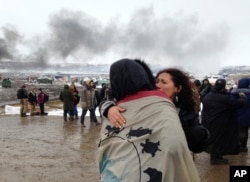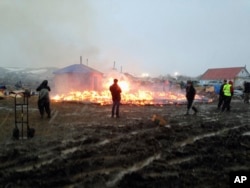A few dozen demonstrators opposed to the Dakota Access pipeline defied a Wednesday deadline to leave a protest camp they have occupied for months to demand an end to construction of the project, saying they were prepared to be arrested.
Police begin arresting the protesters around 5 p.m. local time for failing to meet deadline to leave North Dakota camp.
President Donald Trump has pushed for the completion of the multibillion-dollar pipeline since he took office last month, despite objections from Native Americans and environmental activists who say it threatens the water resources and sacred land of the Standing Rock Sioux Tribe.
Republican Governor Doug Burgum and the U.S. Army Corps of Engineers had set a 2 p.m. CST (2000 GMT) deadline for protesters to leave the Oceti Sakowin camp, located on Army Corps land in Cannon Ball, North Dakota.
As freezing rain and snow fell, some demonstrators ceremonially burned tents and other structures at the camp in what they said was a tradition before leaving a dwelling place.
But others said they were going nowhere.
Around three dozen protesters gathered near the camp entrance as the deadline passed. About 20 police vehicles waited up the road and a few dozen protesters remained in other parts of the camp, a Reuters witness said.
"I feel as though now is the time to stand our ground," said Alethea Phillips, 17, a demonstrator from Michigan who has spent three months at the camp.
Chase Iron Eyes, a Standing Rock Sioux member, said the detention of protesters would not dampen their determination.
"There are a lot of grandmothers, there are a lot of women(at the camp). ... There are people who have shown up to stand in solidarity with them," he said in a video broadcast. "You can't arrest a movement. You can't arrest a spiritual revolution."
Protesters and law enforcement have clashed multiple times and hundreds of people have been arrested since demonstrations began in August.
The Standing Rock Sioux asked protesters to leave the area in December as they challenged the pipeline plans in court, but some 300 demonstrators had remained.
Ed Higgins, a 39-year-old military veteran from Lowell, Massachusetts, said he planned on getting arrested peacefully, but was unsure how many other fellow protesters would be taken into custody. "We will not know until it happens," he said.
Law enforcement officials urged people to leave the camp ahead of the deadline, saying they could be at risk from spring floods, as well as to remove anything that could be damaged during cleanup efforts.
The officials have agreed to a request by camp leaders that only Native American cleanup crews be used. One activist, HolyElk Lafferty, said she had asked that government-contracted crews not begin their work until after the camp is cleared.
"It would raise the alarm and panic and not promote a peaceful process today," Lafferty said. "I want people to be safe on both sides."
State officials have set up a travel assistance center to provide departing protesters with food, water and health check-ups, as well as a voucher for one night's accommodation at a Bismarck hotel and a bus ticket home.
"We're making sure that we're taking care of people that may not have means," said a spokesman for the state highway patrol, Lieutenant Tom Iverson.
Trump, a Republican, signed an executive order clearing the way for the $3.8 billion pipeline to proceed.
A judge denied a request earlier this month by two tribes seeking to halt construction. The tribes are seeking an injunction to order the Army Corps to withdraw the easement.
The pipeline will be complete and ready for oil between March 6 and April 1, according to court documents filed Tuesday.







